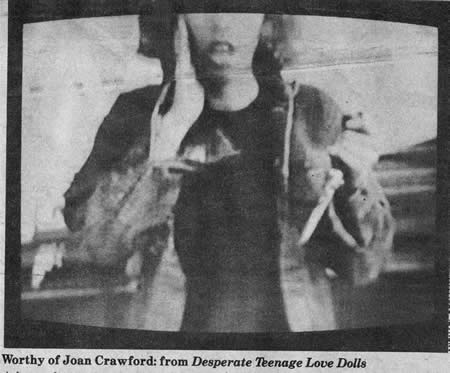Village Voice

|
Riffs and Licks Redd Kross's New Broom By Don Howland The other day a friend showed me a collection of books from her childhood in Germany. One little tale was illustrated by a sequence of three drawings: a goldilocks type playing with matches, the girl consumed by flames while her two cats wail, and a pile of ashes, two shoes, and the two cats weeping into yellow kerchiefs. My friend seized the book from me. "My God! I grew up with this. What a hellish way to learn a lesson!" Indeed. But any more so, I wonder' than the way millions of Americans her age learned their lessons-from the Brady Bunch or the Partridges or Love American Style? Redd Kross is America's best punk (in the pre-Pistolean sense) rock and roll band in large part because they learned their lessons so well. To consider the excesses that made their music possible staggers the mind-the daily four-hour blocks of sitcoms, the six packs of Fresca, the cartons of Ho-Ho's, the baggies of ludes. Redd Kross is the real junk. Asheton distorted his guitar into on the Stooges' "Anne" was a once-in-a-lifetime fluke of physics. "Citadel," from the Stones' un-rootsy Satanic Majesties, may be the EP's musical pinnacle, but conceptually the nod goes to the glitterpop revamp of Boyce and Hart's "Blow You a Kiss in the Wind." If my memory serves me correctly (and it generally does in instances of utter insignificance), that song debuted on an episode of Bewitched, sung, in fact, by Elizabeth Montgomery, who in the guise of Sam's conniving cousin Serena, had kidnapped the songwriting team because she wanted to be a pop star. Redd Kross's version would do Wayne County proud. And their magisterial reworking of their own Linda Blair," KISSed and retitled "Linda Blair '84," with not one but two ago agonizingly monotonous breaks (A la Kiss's "Black Diamond" dénouement) closes the EP and as Warhol once described the Velvet's aim-leaves 'em wanting less. Two additional '84 projects are available to consumers-the videocassette of Desperate Teenage Love Dolls, a feature length 8mm variation on the Carrie Nations story starring the McDonalds, and its soundtrack on Gasatanka, theme by Redd Kross. We first see the Love Dolls rocking out in suburbia (lip-synching to Elizabeth Montgomery's original "Blow You a Kiss," in fact) with only the dream of stardom. Circumstances-including beatings and murders-propel a the Dolls onto the street where they are discovered by A&R man Johnny Tramaine who after extracting (or rather, inserting) his fee, puts the hype machine in gear to make the trio a $20 ticket. Later, bitter that he's been skimming 50 per cent off the top, his charges dump a ludicrous amount of acid into his wine and, in a freak-out montage featuring images of Barbra Streisand's face (Yentl posters) and Taco Bells, Tramaine like so many before him, becomes convinced he can fly. Things do not end happily for the Love Dolls either-in a brawl with a gang called the She Devils, guitarist Kitty accidentally kills bassist Bunny. Stunned, she turns the pistol on herself only to find its ammunition spent; in an ending worthy of a Joan Crawford vehicle, we find Kitty huddled on a railroad car, denying her identity to a onetime fan. Despite the home-movie production values, director Dave Markey shows some promise, especially in his employment of soundtrack-cuts segued with incidental music from the Brady Bunch, a knife fight between Kitty and She Devil Tanya Hearst to the final frantic moments of "Stairway to Heaven." There's no Brady's or Zep on the soundtrack, but there are some excellent offerings by RK and the like-minded White Flag and Nip Drivers, old favorites from Black Flag and Sin 34, and three numbers sung by Spock, the onetime leader of L.A.'s seminal girl punks Backstage Pass, that rival the Runaways' best work (and titles-i.e. "Hot Bitch (with an Electric Guitar)"'). Wherever Redd Kross's trash OD leads them next-rock operas? the cover of Tiger Beat? arenas? early graves?-I for one will stay tuned.
|